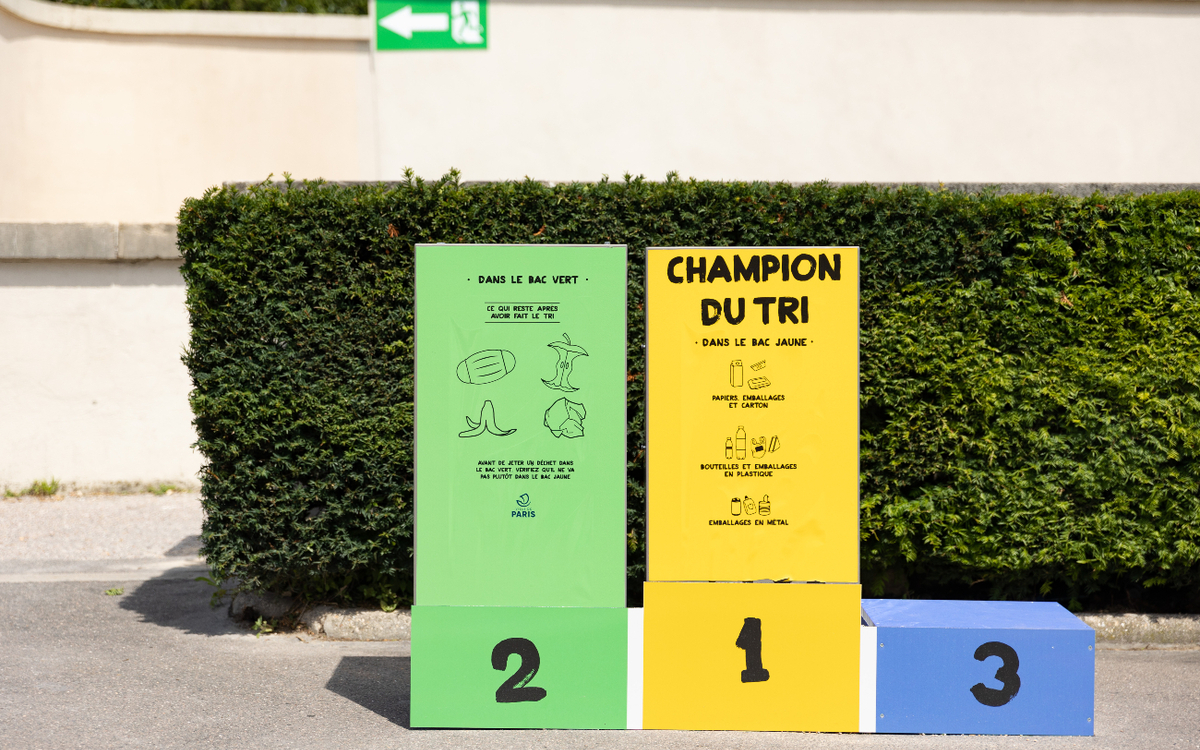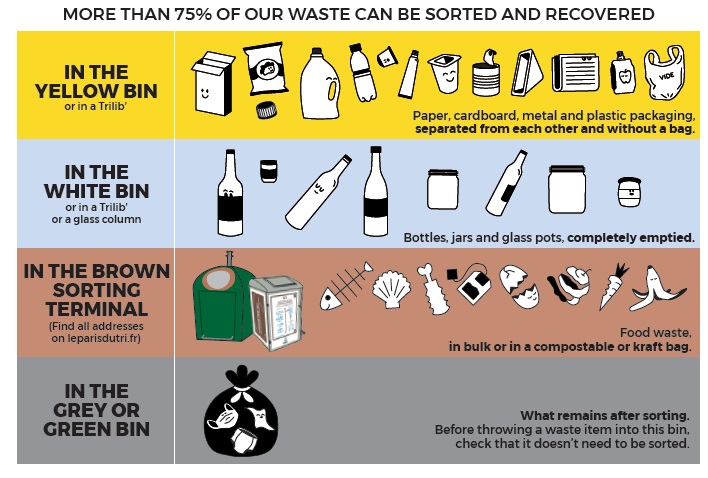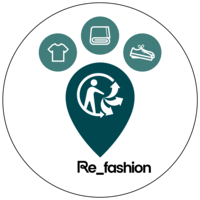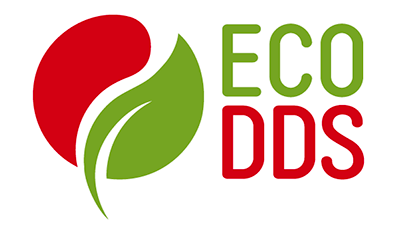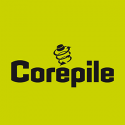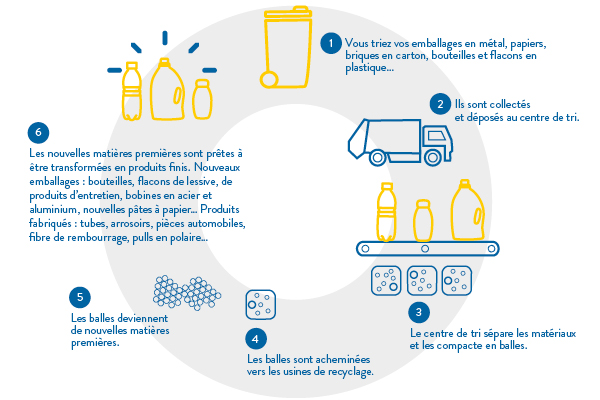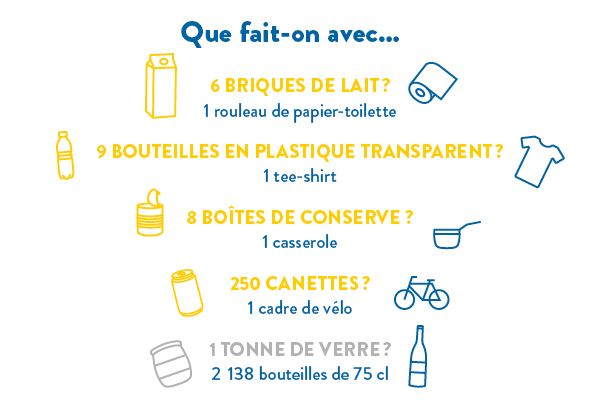Content
In Paris, all waste is sorted
| Waste | Where to drop them off |
|---|---|
| Textiles |
Recycling centers Textile containers Solidarity collections Trimobile Waste collection centers |
| Large appliances |
Recycling centers Points of sale Waste collection centers Community collections |
| Small electrical appliances and telephones |
Where to buy Recycling centers Solidarity collections Trimobile Recycling centers |
|
Furniture (mattresses, furniture…) |
Recycling centers Points of sale Waste collection centers Community collections Free collection from your home or building |
| Batteries and small batteries |
Collection points near you Points of sale Trimobile Recycling centers |
| Ampoules |
Where to buy Trimobile Waste collection centers |
| Dangerous products |
Trimobile Waste collection centers Collection by the Circonscription fonctionnelle, appointment by phone 01 43 61 57 36 |
| Paint cans |
Trimobile Waste collection centers (except Carnot, Jessaint and Invalides) |
| Self-medication waste, syringes | Needle boxes then pharmacies and laboratories |
| Medicaments | Pharmacies |
| Empty drug cartons | Yellow-lidded bin |
| Batteries and waste oils |
Waste collection centres |
| Gas cylinders |
Where to buy Waste collection centers Collection by the Circonscription fonctionnelle, appointment by phone 01 43 61 57 36 |
| Ink cartridges |
Recycling centers Points of sale Trimobile Waste collection centers |
ADEME's sorting assistant
Sorting instructions for the various bins in the garbage can room
.
► What goes in the YELLOW BIN?
The waste disposed of in the yellow bin is sorted and recycled according to its type.
- books and magazines;
- large cardboard boxes folded to take up less space;
- plastic bottles: water, fruit juice, soda, oil, shower gel, shampoo, household products;
- all other plastic packaging: polystyrene trays, yoghurt pots, cling film, plastic bags, tubes of cosmetics, etc. These containers must be empty, but there's no need to rinse them. Caps and lids are accepted, preferably tightly screwed on.
- metal : tins, cans, aerosol cans, metal trays and all small metal packaging (compote bottles, coffee capsules, empty medicine packets, potato chip packets, frozen food packets, jar lids, bottle caps, aluminum foil, etc.).
- corks, metal lids and capsules;
- paper (including bills, envelopes, paper bags and magazines), except toilet paper, paper towels, tissues and paper napkins.
Please note: all packaging must be disposed of empty and loose, not nested together or in a bag!
- contact your janitor or building manager to request one from the local waste management service;
- use the out-of-home sorting solutions offered by the City of Paris: Trilib', Trimobile, Déchèterie-Espace tri, Points tri.
- Waste must be disposed of loose in the yellow bin. The center cannot sort them if they are placed in a plastic bag (or any other container). As soon as the skip is unloaded, the packaging is placed on a conveyor belt and separated by material, manually and mechanically. The sorting staff have no time to open the bags and empty them, or to separate interlocking packaging. The packaging inside will not be recycled.
- diapers, disposable tissues, paper towels and kitchen towels go in the green or grey bin.
The collection of yellow-lidded bins may also be modified in the event of strikes or special weather conditions. This may lead the collection service to exceptionally collect all bins at the same time (those with yellow and green/grid lids).
► What to throw away in the BAC BLANC?
The white bin is used to collect glass containers for recycling.
- contact your janitor or building manager to request them from the arrondissement's waste management service;
- bring them to one of the 1,000 glass recycling bins available in Paris, i.e. one every 150 meters.
-bring them to a Trilib' local sorting bin.
- light bulbs do not go in the white bin. You can take them, even broken ones, to many supermarkets or DIY stores, which have dedicated collection bins at your disposal.
► What to dispose of in the BROWN BORNE?
The brown bollard collects food waste
- after meals: tea bags, coffee filters and paper napkins…
- Meal leftovers : all vegetable and fruit leftovers, salads with or without dressing, potatoes, pasta, rice, all meat, deli and fish leftovers, including shellfish (oyster shells, mussel shells, etc.), cheese, bread and pastry leftovers, etc.
- out-of-date food products: without packaging.
► What to dispose of in the GREEN or GRAY BIN?
Put what's left after sorting in the green/grey bin!
For reasons of safety and hygiene, it is inconceivable to ask sorting center staff to sort raw waste. Once collected, they are sent directly for incineration, where they are transformed into electricity and heat.
► How to sort successfully? Video answer!
Vidéo Youtube
Verre
Textiles
►Click on this link to find your nearest drop-off point.
Green waste
► Green waste collection centers
► Compost your green and kitchen waste
-
at home, thanks to an individual composter or vermicomposter,
-
in your neighborhood, thanks to the collective composter at the foot of your building,
-
to the neighborhood composter.
Hazardous waste
- Bases (caustic soda, ammonia, potash, carbonates, certain amines)
- Organic solvents (white spirit, fuels, alcohol, trichloroethylene)
- Paints and varnishes and their containers
- Glues, resins
- Laboratory bottles (metallic, mineral, toxic salts, organic acids, etc.)
- Ionic solutions (photographic products, iron perchloride, etc.)
- Phytosanitary products (fertilizers, fungicides, insecticides)
You can find all the information you need on these wastes on the website of EcoDDS, the eco-organization in charge of chemical products.
Also concerned :
- Gas cylinders and fire extinguishers
- Mercury thermometers
- Batteries and waste oils
Mixing hazardous waste with other household refuse poses a risk to health and the environment (and to the health of those who work at the collection site). It requires special separate collection
There are three ways to dispose of your hazardous waste in Paris.
1 - The Trimobile accepts the following specific types of hazardous waste: hazardous DIY and gardening products (paints, solvents, etc.), mercury-containing waste and fire extinguishers.
2 - Voluntary drop-off at the following five Déchèterie-Espace Tri for waste accepted at the Trimobile, as well as used oil, batteries and gas cylinders:
Déchèterie-Espace Tri Quai d'Issy les Moulineaux
Poterne des Peupliers sorting center
Porte des Lilas sorting center
Porte de la Chapelle sorting center
Dépèterie-Espace Tri de la Porte de Pantin
3- Home collection
This service is available from Monday to Friday, from 7.30 a.m. to 5 p.m., by appointment. Simply contact the relevant department between 9 a.m. and 5.30 p.m. to make an appointment:
Direction de la Propreté et de l'Eau
Service technique de la Propreté de Paris
Chemical Risks Unit
Tel.: 01 40 30 77 34 / 01 40 30 77 49
Mail: [dpe-stpp-fonc-risqueschimiques puis paris.fr après le signe @]qcr-fgcc-sbap-evfdhrfpuvzvdhrf@cnevf.se[dpe-stpp-fonc-risqueschimiques puis paris.fr après le signe @]
The average waiting time for an appointment is four days. Collection is carried out by trained personnel equipped with a specialized vehicle. For each collection, a toxic waste collection form must be signed by the applicant, who must keep a copy.
Please note that, in view of the health context, the procedures are as follows:
- Waste must be deposited by users on the public highway on arrival of the agents (an appointment is made with a time of arrival). The agents will call the user when they arrive, so that he/she can deposit his/her hazardous waste on the sidewalk).
- Agents do not enter apartments, buildings, yards or gardens.
- Users and agents must respect the rules of social distancing and wear a mask.
Medical waste
Empty blister packs, packaging and leaflets are disposed of in the yellow-lidded bin.
Since 2012, there has been a specific channel for the collection of this waste. In fact, two decrees have entrusted the eco-organization DASTRI with the mission of organizing the free collection network for healthcare waste produced by self-treatment patients. DASTRI is responsible for supplying pharmacists with containers, known as needle boxes (BAA), for the safe collection and storage of syringes and other sharp waste from self-treatment patients.
All perforating healthcare waste, i.e. all sharps waste. This includes lancets, pen needles, transfer needles, microperfusers, catheters and various types of syringes.
So-called "soft" healthcare waste, such as compresses, cotton pads and dressings, should not be stored in needle boxes, but disposed of in the green-lidded bin with household garbage.
Please note that when a healthcare professional (doctor or nurse) provides care in your home, he or she must not leave the waste resulting from this care with you.
DASTRI toll-free number: 0 805 693 536
Fiche R des DASRI perforants
Memo - Resources for DASRI waste referents
Know the pathologies defined for self-treatment
Find out exactly what waste is covered by the needle box
- Once the needle box has been filled, without exceeding the top line, make sure that the final locking system is properly engaged before transporting it to the nearest collection point.
The eco-organization DASTRI is responsible for the collection and disposal of needle boxes, in accordance with environmental regulations specific to infectious risk healthcare waste.
Collection points for needle boxes
In general, it is advisable to keep old X-rays, on the one hand to follow the evolution of a medical problem, and on the other hand to avoid having to repeat the same X-ray several times, which would be costly and expose you to new radiation.
However, some X-rays, for example very old ones, are no longer of any use. What should you do with them?
They should not be disposed of in the household garbage, as old X-rays are often silver-based and contain silver salts, which are toxic if incinerated.
They must therefore undergo specific treatment in specialized facilities. The silver is extracted by electrolysis. This silver is then purified and returned to the precious metal circuit. The cliché sheet (plastic support) is recycled into tubes, pipes, plush, textile fibers and fleece garments.
They can be dropped off at Déchèteries-Espaces tri, Points tri and Trimobiles, or with certain humanitarian organizations such as the Order of Malta: drop them off directly at the head office reception desk at 42 rue des Volontaires (15th) or by filling in the online form.
Please note: the Ordre de Malte now also collects prescription glasses without cases. Telephone number for further information: 01 45 20 80 20.
Ask your radiology center or pharmacist, as in theory they will accept them for reprocessing, but this is not always the case.
Appliances
► Small household appliances, telephones, small computer, hifi and video equipment…
-
drop them off at a collection point (supermarkets, electrical goods stores, etc.).
-
bring them to the Trimobile
-
drop them off at a waste collection centre
► Large household appliances, large computer, hifi and video equipment
-
drop them off at an outlet that takes them back (supermarkets, electrical goods stores, etc.).
-
request free home pickup by ecosystem, online or by phone
-
drop them off at a waste collection centre
Batteries, small batteries and accumulators
.
-
bring them to the Trimobile
-
take them to a waste collection centre
Batteries for electric bicycles and scooters are not accepted at waste collection centers or Trimobile. They must be returned to the vehicle seller.
Some depots accept car batteries.
Bulbs and lamps
Edible oils
Gravats
Games and toys
You can also bring them to one of the following 3 drop-off centers, which accept them:
Sporting and leisure goods
Small DIY and garden items
Why sort?
To preserve natural resources
To limit greenhouse gases
-
1 tonne of steel recycled = 1.78 tonnes of CO2 equivalent saved
-
1 tonne of recycled aluminium = 6.89 tonnes of CO2 equivalent saved
-
1 tonne of recycled paper and cardboard = 0.04 tonnes of CO2 equivalent saved
-
1 tonne of food packaging recycled = 0.13 tonnes of CO2 equivalent saved
-
1 tonne of PET plastic bottles recycled = 2.29 tonnes of CO2 equivalent saved
-
1 tonne of HDPE plastic bottles (opaque plastic) = 1.53 tonnes of CO2 equivalent saved
-
1 tonne of glass recycled = 0.46 tonnes of CO2 equivalent saved
The journey of sorted waste
Recycling examples:
Are you a janitor or building resident?
Cleaning services in your arrondissement: addresses and contacts
2 rue des Quatre-Fils (Paris 3rd) - phone: 01 55 34 77 17 - fax: 01 84 82 11 31
5th and 6th arrondissements
100 bis, rue du Cherche Midi (Paris 6e) - phone: 01 53 63 03 30 - fax: 01 71 18 73 59
7th and 8th arrondissements
7, rue Maleville (Paris 8e) - phone: 01 45 61 57 00 - fax: 01 45 61 54 83
9th and 10th arrondissements
75, rue du Fbg Poissonnière (Paris 9th) - phone :01 53 34 11 11 - fax : 01 71 37 76 68
11th arrondissement
40, rue Pétion (Paris 11th) - phone :01 55 28 36 60 - fax : 01 71 28 71 79
12th arrondissement
37-39, avenue Ledru-Rollin (Paris 12e) - phone :01 43 41 74 44 - fax : 01 71 28 36 75
13th arrondissement
6/8 rue Albert Bayet (Paris 13th) - phone: 01 53 94 15 30 - fax: 01 71 28 73 00
14th arrondissement
140 bis, rue du Château (Paris 14th) - phone: 01 56 53 10 20 - fax: 01 53 90 68 54
15th arrondissement
52, rue Dombasle (Paris 15th) - phone: 01 45 45 86 00 - fax: 01 71 28 21 64
16th arrondissement
9 ter, rue des Boulainvilliers (Paris 16th) - phone: 01 55 74 44 60 - fax: 71 18 97 92 01
17th arrondissement
7, rue Maleville (Paris 8e) - phone: 01 45 61 57 17 - fax: 01 45 61 56 50
18th arrondissement
17 bis, rue Joseph de Maistre (Paris 18e) - phone: 01 53 09 22 60 - fax: 01 71 28 77 10
19th arrondissement
66, rue de Meaux (Paris 19th) - phone: 01 53 72 54 00 - fax: 01 53 72 54 91
20th arrondissement
14/18 rue des Prairies (Paris 20th) - phone: 01 40 33 83 33 - fax: 01 72 63 43 00
